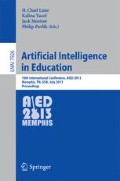Abstract
Both Knowledge Tracing and Performance Factors Analysis, are examples of student modeling frameworks commonly used in AIED systems (i.e., Intelligent Tutoring Systems). Both of them use student correctness as a binary input, but student performance on a question might better be represented with a continuous value representing a type of partial credit. Intuitively, a student who has to make more attempts, or has to ask for more hints, deserves a score closer to zero, while students who asks for no hints and just needs to make a second attempt on a question should get a score close to one. In this work, we present a simple change to the Knowledge Tracing model and a simple (non-optimized) method for assigning partial credit. We report our real data experiment result in which we compared the original Knowledge Tracing (OKT) model with this new Knowledge Tracing model that uses partial credit as input (KTPC). The new model outperforms the traditional model reliably. The practical implication of this work is that this new technique can be widely used easily, as it is a small change from the traditional way of fitting KT models.
Access this chapter
Tax calculation will be finalised at checkout
Purchases are for personal use only
Preview
Unable to display preview. Download preview PDF.
References
Arroyo, I., Cooper, D.G., Burleson, W., Woolf, B.P.: Bayesian Networks and Linear Regression Models of Students’ Goals, Moods, and Emotions. In: Handbook of Educational Data Mining, pp. 323–338. CRC Press, Boca Raton (2010)
Attali, Y., Powers, D.: Immediate feedback and opportunity to revise answers to open-end questions. Educational and Psychological Measures 70(1), 22–35 (2010)
Baker, R.S.J.d., Corbett, A.T., Gowda, S.M., Wagner, A.Z., MacLaren, B.A., Kauffman, L.R., Mitchell, A.P., Giguere, S.: Contextual Slip and Prediction of Student Performance after Use of an Intelligent Tutor. In: De Bra, P., Kobsa, A., Chin, D. (eds.) UMAP 2010. LNCS, vol. 6075, pp. 52–63. Springer, Heidelberg (2010)
Corbett, A., Anderson, J.: Knowledge Tracing: Modeling the Acquisition of Procedural Knowledge. User Modeling and User-Adapted Interaction 4, 253–278 (1995)
Feng, M., Heffernan, N.: Can We Get Better Assessment from a Tutoring System Compared to Traditional Paper Testing? Can We Have Our Cake (Better Assessment) and Eat It too (Student Learning during the Test)? In: Aleven, V., Kay, J., Mostow, J. (eds.) ITS 2010, Part II. LNCS, vol. 6095, pp. 309–311. Springer, Heidelberg (2010)
Masters, G.N.: A rasch model for partial credit scoring. Psychometrica 47, 149–174 (1982)
Pardos, Z.A., Heffernan, N.T.: Modeling Individualization in a Bayesian Networks Implementation of Knowledge Tracing. In: De Bra, P., Kobsa, A., Chin, D. (eds.) UMAP 2010. LNCS, vol. 6075, pp. 255–266. Springer, Heidelberg (2010)
Pardos, Z.A., Heffernan, N.T.: Navigating the parameter space of Bayesian Knowledge Tracing models: Visualization of the convergence of the Expectation Maximization algorithm. In: Proceedings of the 3rd International Conference on EDM (2010b)
Pavlik, P.I., Cen, H., Koedinger, K.: Performance Factors Analysis – A New Alternative to Knowledge. In: Proceedings of the 14th International Conference on Artificial Intelligence in Education, pp. 531–538 (2009)
Tang, K.L.: Polytomous item response theory (IRT) models and their applications in large-scale testing problems: Review of the literature. Educational Testing Service Technical Report (1996), http://www.ets.org/Media/Research/pdf/RM-96-08.pdf
Wang, Y., Heffernan, N.T., Beck, J.E.: Representing Student Performance with Partial Credit. In: Proceedings of the 3rd International Conference on Educational Data Mining, Pittsburgh, PA (2010)
Author information
Authors and Affiliations
Editor information
Editors and Affiliations
Rights and permissions
Copyright information
© 2013 Springer-Verlag Berlin Heidelberg
About this paper
Cite this paper
Wang, Y., Heffernan, N. (2013). Extending Knowledge Tracing to Allow Partial Credit: Using Continuous versus Binary Nodes. In: Lane, H.C., Yacef, K., Mostow, J., Pavlik, P. (eds) Artificial Intelligence in Education. AIED 2013. Lecture Notes in Computer Science(), vol 7926. Springer, Berlin, Heidelberg. https://doi.org/10.1007/978-3-642-39112-5_19
Download citation
DOI: https://doi.org/10.1007/978-3-642-39112-5_19
Publisher Name: Springer, Berlin, Heidelberg
Print ISBN: 978-3-642-39111-8
Online ISBN: 978-3-642-39112-5
eBook Packages: Computer ScienceComputer Science (R0)

